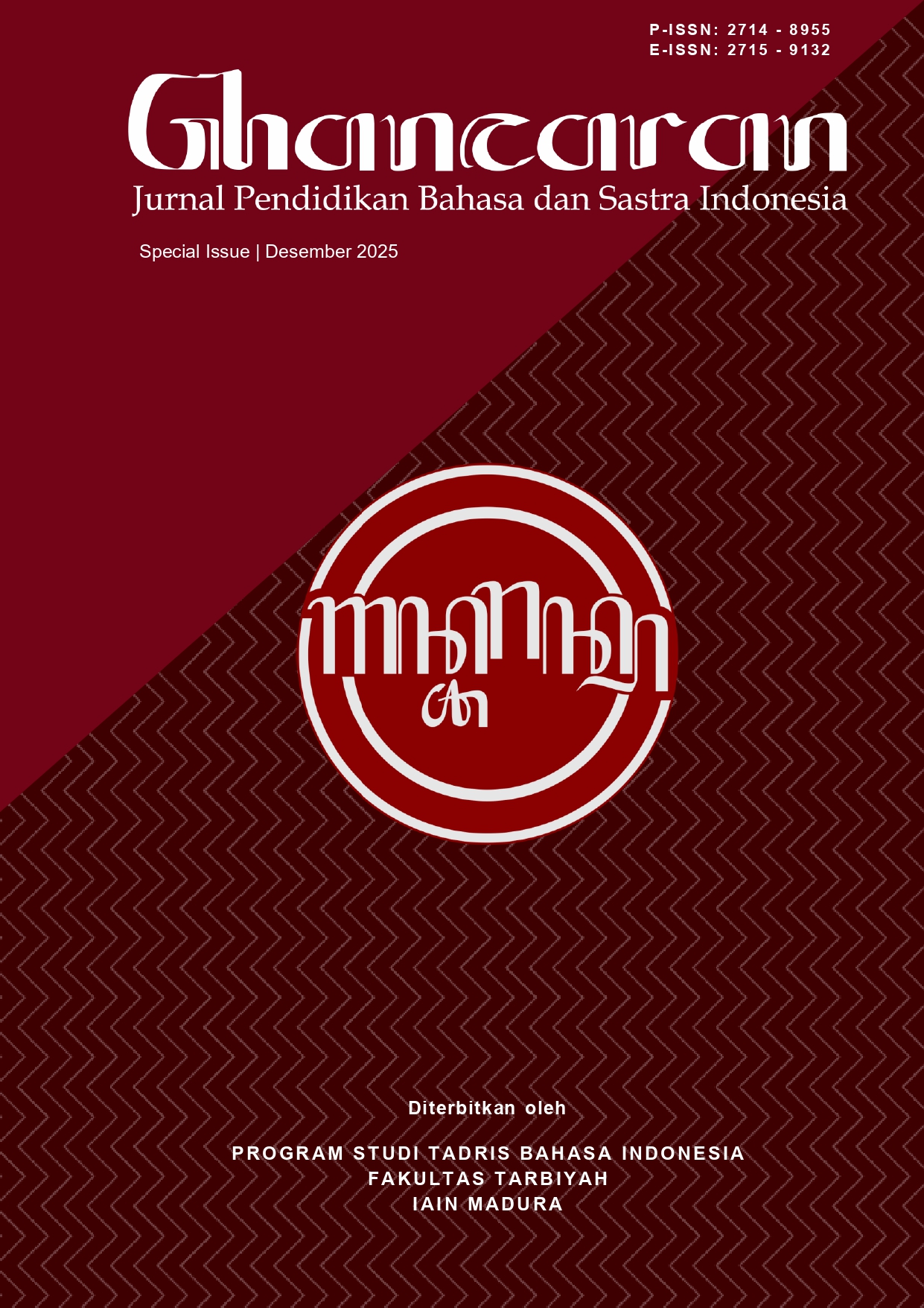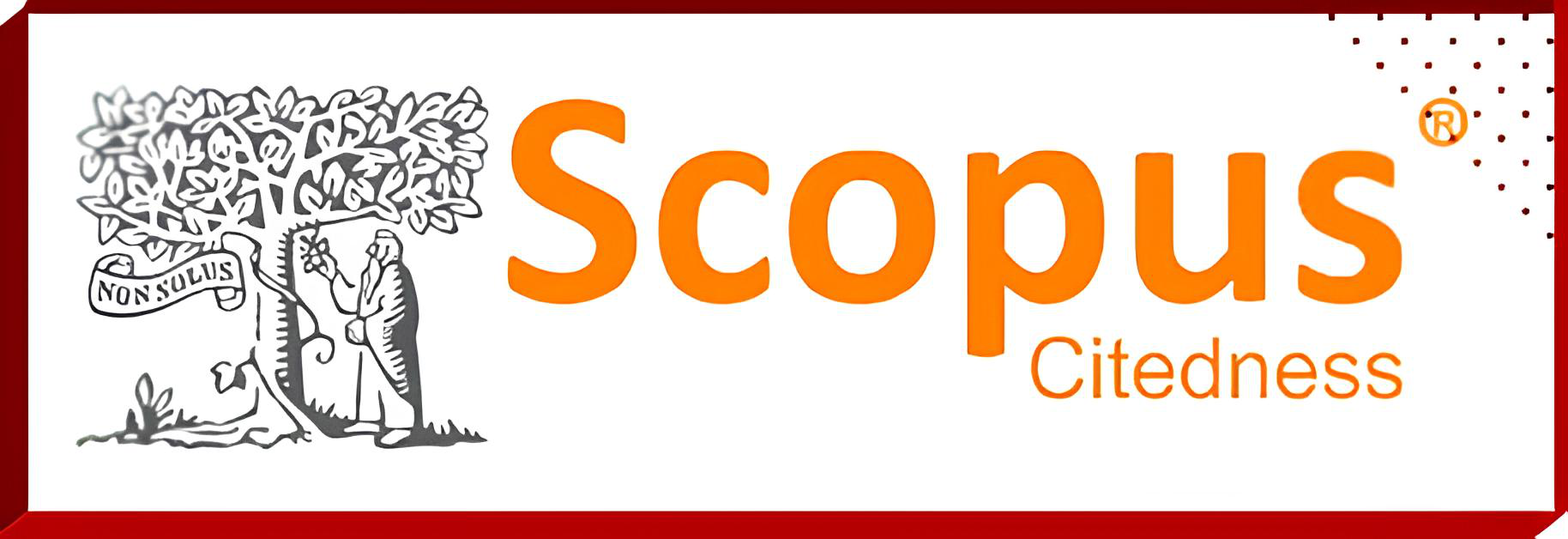Reorienting Children's Interests in Fiction: A Comparative Study of Social-Emotional Values in Indonesian Folktales and Digital Anomalous Stories
 Abstract views: 349
,
Abstract views: 349
,
 PDF downloads: 197
PDF downloads: 197
Abstract
Children’s interests shift from traditional fiction to digital storytelling, indicating a preference for emotionally intricate and character-focused narratives. A poll of 113 Indonesian children aged 8 to 12 provided additional insights into their preferred types of stories. This study examines the implications of this transformation for educational objectives, particularly about cultivating social and emotional competencies and fostering character development. Six narrative texts were analyzed utilizing a qualitative methodology. Three Indonesian folktales were selected due to their narrative composition and factual foundation. The last three were anomaly-themed digital narratives from popular TikTok accounts frequented by children, including @cerita_anomali_lucu, @pylan.page, and @piq.man6, each boasting millions of views and likes. We utilized NVivo 15 software to assist us with thematic coding. We examined three domains of character education (empathy, integrity, and accountability) and two facets of social-emotional learning (SEL) (emotion management and relational skills). The findings indicate that Indonesian folktales consistently provide explicit moral teachings and enhance emotional intelligence. Conversely, narratives involving digital anomalies frequently feature fragmented plots and protagonists exhibiting emotional instability. Although these digital narratives may captivate and amuse children, they often lack explicit moral lessons. This study proposes a pedagogical approach integrating folktales' ethical clarity with digital media's format.
Downloads
References
Bastos, M., & Tuters, M. (2023). Meaningful Disinformation: Narrative Rituals and Affective Folktales. Big Data & Society, 10(2).
Butvilas, T., Bubnys, R., Colomer, J., & Ortíz, D. C. (2022). Dependence of Socio-Emotional Competence Expression on Gender and Grade for K5–K12 Students. Education Sciences.
Chee, S. Y. (2024). Age-Related Digital Disparities, Functional Limitations, and Social Isolation: Unraveling The Grey Digital Divide Between Baby Boomers and The Silent Generation In Senior Living Facilities. Aging and Mental Health, 28(4), 621–632.
Chen, H., & Chen, S.-Y. (2024). The Effects of Non-Violent Communication-Based Emotional Education Using a Digital Storytelling Platform on Adolescents’ Emotional Learning: Gender Differences. 683–684.
Craig, A. B., Brown, E., Upright, J., & DeRosier, M. E. (2016). Enhancing Children’s Social Emotional Functioning Through Virtual Game-Based Delivery of Social Skills Training. Journal of Child and Family Studies, 25(3), 959–968.
Fenanlampir, A. (2024). Emotional Skills With Homogeneity Psycho Cognition Strategy: A Study of Physical Education in Elementary Schools. Retos.
Franco, B. (2025). A Few Meanings of a Literary Landscape. International Journal of Literary Humanities, 23(3), i–vii.
Freeland, L., O’Reilly, M., Fleury, J., Adams, S. D., & Vostanis, P. (2022). Digital Social and Emotional Literacy Intervention for Vulnerable Children in Brazil: Participants’ Experiences. The International Journal of Mental Health Promotion, 24(1), 51–67.
Ghosh, D. (2024). The Influence of Storytelling on Emotional and Cognitive Growth in Early Childhood. International Journal For Multidisciplinary Research, 6(6).
Gkoutsioukosta, Z., & Apostolidou, V. (2023). Building Learning Communities through Digital Storytelling. The Social Science.
Green, J. (2024). TikTok and the changing landscape of therapeutic digital spaces of care. Digital Geography and Society, 6.
Haring, L. (2023). Folktales of Mayotte, an African island. In Folktales of Mayotte, an African Island. Open Book Publishers.
Hikmah, H., Wongsonadi, S. K., Hartati, S., & Jahja, Y. (2024). Enhancing Early Childhood Social-Emotional Skills through Innovative Interactive Learning Media. Asian Journal of Social and Humanities, 3(3), 526–544.
Jafari, M., Beyad, M. S., & Ramin, Z. (2023). A Novel of De-Formation: Cormac Mccarthy’s Child of God as a Postmodern Gothic Parody of the Bildungsroman. Humanities and Social Sciences Communications, 10(1).
Juez, B. L. (2025). More-Than-Human Literary Landscapes: An Ecocritical Perspective. International Journal of Literary Humanities, 23(3), 125–146.
K, D. (2024). 100 Cerita Rakyat Nusantara (Agata Vassilisa, Ed.; 2nd ed., Vol. 1). Gramedia.
Kalach, N. (2022). Always the Villain: The Wife in Emirati Folktales. A Socio-cultural and Linguistic Reading. Rocznik Orientalistyczny, 75(2), 103–121.
Kazanjian, C. J. (2023). The Social-Emotional Learning Upgrade: Merging SEL and Technology Curricula to Support Young Learners. In The Social-Emotional Learning Upgrade: Merging SEL and Technology Curricula to Support Young Learners.
Kim, M., & Lee, Y. (2023). Comparison of the Effect of Fiction Reading on Social Cognition according to Reading Media.
Kumalasari, D., Purwanta, H., & Aw, S. (2024). Comparative Analysis of Generation Z’s Digital History Literacy in History Education Majors on Java Island: A Study of History Digital Literacy. Journal of Education and E-Learning Research, 11(1), 90–96.
Liao, S.H., Widowati, R., & Lee, C.Y. (2024). Data Mining Analytics Investigation on Tiktok Users’ Behaviors: Social Media App Development. Library Hi Tech, 42(4), 1116–1131.
López-Ornelas, E., & Abascal-Mena, R. (2018). An Interactive Digital Storytelling to Identify Emotions and Consequences in the Elementary School Child (pp. 218–230). Springer, Cham.
Manganello, F., & Baldacci, M. (2024). Digital Stories and Inclusive Cultures at School: A Research Study in an Italian Primary Multicultural Classroom. Education Sciences, 14(10), 1108.
Maranatha, J. R., Wulandari, H., & Briliany, N. (2024). Early Empathy: Impact of Digital Storytelling, Traditional-Storytelling, and Gender on Early Childhood. Jurnal Pendidikan Usia Dini, 18(1), 218–231.
Masykuroh, Q., & Fatimah, S. (2019). Girlhood and Feminine Ideals: Linguistic Representation of Femininity in Indonesian Folktales. Humanities and Social Sciences Reviews, 7(3), 356–361.
Munir, H., Naz, S., Din Khan, J. U., Taj, T., Kashif, M., & Muhammad, D. (2023). Association Between Socio-Emotional Competence and Self-Efficacy of Nurse-Educators in Peshawar. PJMHS.
Novianti, N. (2022). Indonesian Folk Narratives: On the Interstices of National Identity, National Values, and Character Education. Journal of Ethnology and Folkloristics, 16(1), 99–116.
Palaigeorgiou, G., Vroikou, G., Nikoleta, C., & Bratitsis, T. (2019). Wearable E-Textile as a Narrative Mediator for Enhancing Empathy in Moral Development (pp. 457–467). Springer, Cham.
Poskakalova, T. A. (2023). Digital Storytelling as a Means of Education and Formation of Spiritual and Ethical Values in Adolescence (based on Classic Literature Material). Psychological Science and Education, 28(4), 177–189.
Propp, V. (2009). Morphology of the Folktale (2nd ed.; L. Scott, Trans.). University of Texas Press.
Putikadyanto, A. P. A., Soepardjo, D., & Savitri, A. D. (2025). Strategi Permintaan Maaf dalam Interaksi Jual Beli Etnis Madura: Kajian Etnocyberpragmatik. Entita: Jurnal Pendidikan Ilmu Pengetahuan Sosial dan Ilmu-Ilmu Sosial, 989-1006.
Qomariyah, U., Doyin, M., Zuliyanti, Z., & Prabaningrum, D. (2018). The Representation of Prophetic Messages in the Folklore of Tegal Regency. Journal The Messenger, 10(2), 195.
Retnowati, R., Ernawati, E., & Akun, A. (2018). Ecocriticism Values in the Indonesian Folktale Timun Emas (Golden Cucumber). Humaniora.
Saleha, L., Baharun, H., & Utami, W. T. (2022). Implementation of Digital Literacy to Develop Social Emotional Skills in Early Childhood. 1(1), 1.
Saunders, K. V., & Sanders, N. O. (2025). Section 1: Understanding Social and Emotional Learning in Marginalized Communities: the Foundation of Social and Emotional Learning (SEL) in Education. In The Power of Social and Emotional Learning for Student Success (pp. 1–20). IGI Global.
Schjelde, T. J., & Lie, I. N. (2021). The Impact of Emotions on Learning and Motivation in Producing and Presenting Digital Stories. 17(01).
Schlauch, M., Sylla, C., & Gil, M. L. (2022). Investigating Social Emotional Learning at Primary School through Guided Interactive Storytelling. ACM SIGCHI Annual Symposium on Computer-Human Interaction in Play.
Sharma, D., & Dwivedi, A. V. (2023). Discourse and Context: Beyond the Morphology of Folktales. IUP Journal of English Studies, 18(4), 60–71.
Shirazi, Y. G., Punamäki, R.-L., Peltonen, K., Malekzadeh, M., & Esmaeili, O. (2021). Narrative-Based Intervention and Emotional Intelligence in Female Children. 8(1).
Sugiarti, S., Andalas, E. F., & Bhakti, A. D. P. (2022). Representasi Maskulinitas Laki-Laki Dalam Cerita Rakyat Nusantara. Satwika Kajian Ilmu Budaya Dan Perubahan Sosial, 8(1), 181–196.
Sulistianingsih, E., Jamaludin, S., & Sumartono, S. (2018). Digital Storytelling: A Powerful Tool to Develop Students’ Emotional Intelligence. 1(2), 33–40.
Suryani, R., Pranoto, S., & Astuti, B. (2020). The Effectiveness of Storytelling and Roleplaying Media in Enhancing Early Childhood Empathy. Journal of Primary Education, 9(5), 546–553.
Thompson, S. (1955). Stith Thompson’s Motif-Index of Folk-Literature. Indiana University Press, 195558.
Umucu, E., & Lee, B. (2024). Employment and Emotional Well-being in Veterans with Mental Illness. Stress and Health, 40(3).
Vettori, G., Ruffini, C., Andreini, M., Megli, G., Fabbri, E., Labate, I., Biánchi, S., & Pecini, C. (2022). Investigating Children’s Ability to Express Internal States Through Narratives and Drawings: Two Longitudinal Studies During the Pandemic. Children.
Wan-Lau, R. (2020). Our Folktales: The All-time Favourite Folktales of Asia. In Our Folktales: The All-time Favourite Folktales of Asia. World Scientific Publishing Co. Pte. Ltd.
Wulandari, D., Ulfa, S. M., & Ridwan, A. (2019). The Effect of Zimmer Twins as Digital Storytelling on Students’ Narrative Text Writing. 7(2), 53–58.
Wulandari, M. D. (2023). Digital Tale Media to Improve the Emotional Intelligence of Elementary School Students. Auladuna, 10(1), 75–85.
Zarifsanaiey, N., Mehrabi, Z., Kashefian-Naeeini, S., & Mustapha, R. (2022). The Effects of Digital Storytelling with Group Discussion on Social and Emotional Intelligence among Female Elementary School Students. Cogent Psychology, 9(1).
Copyright (c) 2025 GHANCARAN: Jurnal Pendidikan Bahasa dan Sastra Indonesia

This work is licensed under a Creative Commons Attribution-ShareAlike 4.0 International License.
Ghancaran: Jurnal Pendidikan Bahasa dan Sastra Indonesia uses an Open Access Policy under the Creative Commons Attribution-ShareAlike 4.0 International License. Authors publishing in this journal agree to the following terms:
- Ghancaran Journal holds the copyright and grants the journal rights for first publication with the work simultaneously licensed under a

The work is distributed under Creative Commons Attribution-ShareAlike 4.0 International License which allows others to share, copy, and redistribute the material in any media or format and adapt, remix, change, and develop the material even for commercial purposes, as long as it is stated credit and license derivative works under similar terms. - Authors may make additional contractual arrangements for non-exclusive distribution of the journal's published work version.
- Authors are permitted to post their work online (e.g., in institutional repositories or on their websites) before and during submission, as doing so may lead to productive exchange.



















